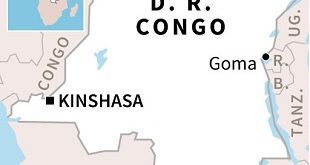
Kenya | AFP | Kenya on Friday launched Africa’s biggest wind power plant, a mammoth project in a gusty stretch of remote wilderness that now provides nearly a fifth of its energy needs.
The $680-million (600 million euro) project, a sprawling 365-turbine wind farm on the eastern shores of Lake Turkana, will deliver 310 megawatts of renewable power to the national grid of East Africa’s most dynamic economy.
The largest private investment in Kenya’s history, the Lake Turkana Wind Power project was beset with delays and took nearly a decade to rise from the arid landscape 600 kilometres (372 miles) north of Nairobi.
The Turkana project, lying in a natural corridor dubbed “the windiest place on earth”, is promised to harness this endless power at low cost, officials say.
“It has been an incredible journey. Clearly (this is) a very historic day,” Rizwan Fazal, the executive director of the Lake Turkana Power Project said ahead of a ceremony launching the project.
“It sends a very strong signal about Kenya being ripe for projects.”
The project, far more ambitious in scale than rivals elsewhere on the continent, has been closely watched as a case study of investing in renewables in Africa, where demand for energy is soaring as economies grow and populations swell.
In Kenya — which relies heavily on hydropower and geothermal — power is unreliable and costly, hindering business as energy-intensive sectors such as manufacturing look to take off.
President Uhuru Kenyatta has previously committed to 100 percent renewable energy for Kenya by 2020 — a pledge the government has been accused of betraying with plans to build a coal-fired power plant off the coast in Lamu.
That project — deemed unnecessary by experts — has been stalled by legal challenges.
– The Turkana Corridor –
The Lake Turkana wind plant, connected through a 428-kilometre power line to the national grid in Suswa, is now generating 15 percent of Kenya’s entire installed capacity.
The windmills, manufactured by Danish company Vestas, had to be brought one-by-one overland from the Kenyan port of Mombasa, some 1,200 kilometres away. More than 200 kilometres of road leading to the site had to be upgraded.
The nearly-50 metre turbines were engineered to handle the fierce gusts that tear through the “Turkana Corridor”, a wind tunnel that generates optimal conditions, year round.
The project involved years of planning and construction but the turbines went up quicker than one a day, with the last raised in March 2017, ahead of schedule.
But difficulties in financing the transmission line, being laid by state-owned power company Ketraco, and problems acquiring land, meant this landmark project didn’t connect to the grid for another 18 months — in September 2018.
The wind farm attracted a $200 million loan from the European Investment Bank, the EU’s lending facility, as well as finance from a consortium of European and African companies.
 The Independent Uganda: You get the Truth we Pay the Price
The Independent Uganda: You get the Truth we Pay the Price


